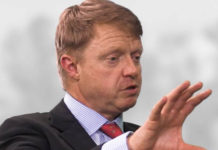[miningmx.com] — PERUVIAN President Ollanta Humala swore in a new team of ministers on Sunday in a shake-up that could lead to harsher crackdowns on social protests but will leave the country’s free-market economic model in place.
Humala, who was a soldier before becoming a politician, named Oscar Valdes, a former army officer who was his instructor in the military, to be prime minister.
He replaces Salomon Lerner, a businessman who helped Humala shed his left-wing image to win election in June, forged ties with investors and led efforts to solve social disputes through dialogue during his short five-month tenure.
Critics said the promotion of Valdes, who had been interior minister, meant the government would be less willing to negotiate with rural communities opposed to billions of dollars in new mining and oil projects and quicker to use authoritarian tactics to break up a growing number of protests.
“We don’t support the militarisation of the government of Humala, which was democratically elected,” former President Alejandro Toledo told reporters.
Toledo, an unsuccessful presidential candidate this year, said his Peru Posible party would distance itself from the ruling party, Gana Peru, but still vote with it in Congress where it has a working majority. Peru Posible had held two ministerial posts, defense and labor, but chose not to participate in the Cabinet after the shuffle.
“We don’t have any faith in Valdes,” said Gregorio Santos, governor of the region of Cajamarca, who has opposed a $4.8 billion gold mine proposed by US-based Newmont Mining . “He isn’t interested in dialogue at a time when the government is going to face social conflicts,” he told the newspaper El Comercio.
Valdes dismissed worries Humala would lead as a strongman but said that as prime minister he would introduce order in a Cabinet that had at times appeared disjointed and full of clashing personalities.
“This isn’t a militarisation of the government,” Valdes said on television. “There were errors in coordination that will be fixed. This Cabinet will work more and talk less.”
Humala declared a state of emergency last week that gave the army and police special powers to quash roadblocks against Newmont’s Conga project, the first real sign of his willingness to use tough tactics since he took office in July. Days later, Peru’s counterterrorism police detained two leaders of the protest as the crackdown widened.
Valdes reportedly had urged Humala to take tough measures, frustrated that Lerner’s efforts to negotiate a truce over Conga had failed and worried that Humala would face more protests nationwide.
More than 200 disputes nationwide have threatened to delay $50bn in planned mining and oil projects that Humala says would fuel economic growth for years.
But the projects often anger rural communities worried about pollution, losing control of scarce water supplies, or getting their share of lucrative mining profits.
TECHNOCRATS RUN ECONOMY, LEFT MARGINALISED
Humala replaced 10 of his 19 ministers in a swearing-in ceremony, but reappointed Finance Minister Luis Miguel Castilla, who is well-regarded by Wall Street for his management of one of the world’s fastest-growing economies.
Trade Minister Jose Luis Silva, who has pushed an ambitious free-trade agenda for the Andean country, also stayed in his post.
Jorge Humberto Merino, an engineer who worked for years for the government agency that promotes foreign investment, was named mines and energy minister.
The appointment of those three technocrats also showed that Humala’s first Cabinet shake-up would not cause a sudden turn to the left or roll back years of pro-market reforms.
Carlos Tapia, a longtime leftist aide who supported Humala for years, quit the government recently, complaining of being marginalised.
Since taking office in July, Humala has raced to steer more social spending to rural areas to defuse community opposition to natural resource projects in poor towns left behind by Peru’s decade-long economic boom.
But he has found it difficult to mediate conflicts and has labeled as “intransigent” the protesters who had hoped he would usher in a period of rapid social change.
Although Humala’s approval rating is a relatively high 59%, he has struggled to govern as a moderate in polarised Peru who can keep big business happy while helping poor voters impatient for change.










